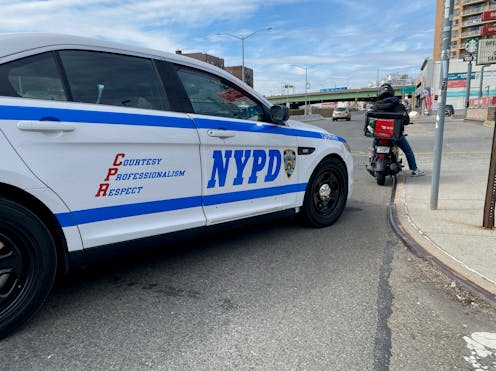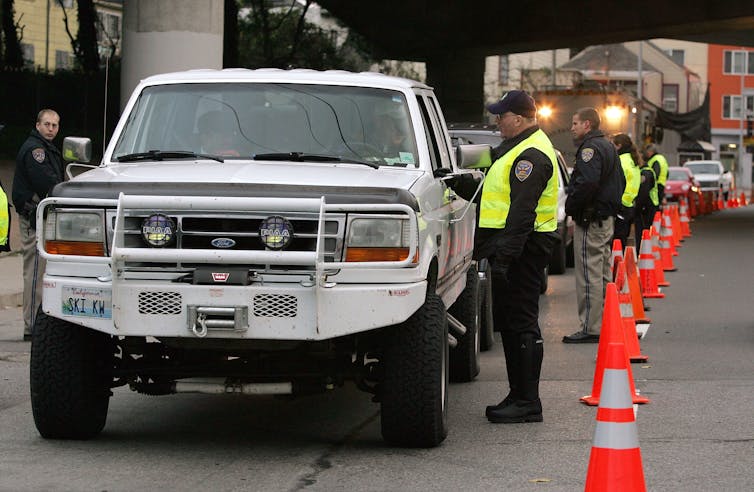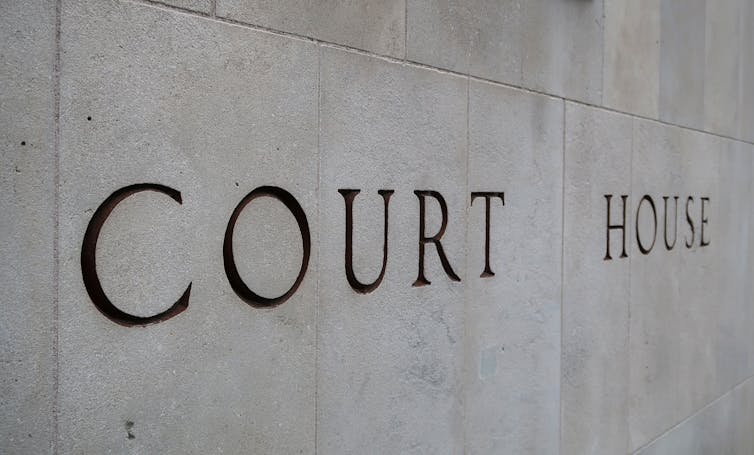
When city governments spend more money than they take in, officials often search for ways to generate revenue. One increasingly common source of money is traffic tickets. And research shows police officers issue more traffic tickets when cities are financially in a deficit.
But police represent only one aspect of this revenue-generating system. Judges and their courts also use traffic citations to generate money for the cities that employ them.
As scholars of public finance, we study how cities raise money to pay for their operations. Our new research indicates that judges in cities facing red ink often use their positions to maximize revenue from traffic tickets. They can do this by adding financial penalties to unpaid tickets. Judges often use the extra penalties to encourage people to pay.
The process of generating dollars through traffic tickets, though, begins with the police.
Revenue-motivated policing
Traffic violations are common. Whether drivers fail to signal a turn or drive a few miles per hour above the speed limit, it is not difficult for police to find someone who violated a traffic law. Officers have the discretion to pick and choose when to ticket and can adjust the number of tickets they issue based on factors that are not related to whether someone broke the law.
Those factors include the race of the driver or the racial makeup of the neighborhood the officers are patrolling. Usually, this means African American drivers and drivers in neighborhoods with more African American residents are ticketed at higher rates than other people.
Another factor affecting ticketing, but unrelated to whether drivers are breaking traffic laws, is the budgetary situation of the city.
One high-profile example of how a city’s use of traffic tickets can be a problem is Ferguson, Missouri. According to a 2015 Department of Justice report, “Ferguson’s law enforcement practices are shaped by the city’s focus on revenue rather than by public safety needs.” And those practices affected African Americans disproportionately. According to that report, African Americans made up 67% of the city’s population at the time, but they were the subjects of 85% of traffic stops, 90% of the tickets, 92% of the warrants police issued and 96% of the arrests.
Ferguson was neither the first nor the only local government to replenish its coffers through traffic tickets. In the years since that federal report, numerous studies have shown that police and other city personnel increase the volume of traffic tickets they issue based on budgetary need.

The practice is actually so common that it has several names: “policing for profit” and “revenue-motivated policing” among them.
After a police officer tickets a driver, the process moves to a court.
Ticketing incentives in court
In some cases, the court that will process traffic tickets is operated by the state; in others, it is operated by the municipality. Regardless, the court is responsible for collecting money from traffic tickets.
But which court hears the case matters quite a bit. If a traffic ticket is settled in a state court, the money from fees is divided across the state and its various local governments. But if that same ticket is settled in a municipal court, then the vast majority of the money goes to the city.
Our research examined how this difference affected traffic tickets in Indiana. Like prior research, we found that police from cities facing revenue shortages issued more tickets. But we showed that this only happened when cities ran their own municipal courts. Put another way, the police are only more likely to ticket when it is profitable for the cities they serve.
We also examined how judges use their power to collect more money.
Ferguson once again provides an example of how authorities can abuse this power. As detailed in the Justice Department report, judges did not consider a person’s financial status when levying penalties or setting payment deadlines. They also aggressively applied optional fees for late payments. Lastly, judges and police officers provided incorrect or incomplete information about when or whether defendants were required to appear in court. That meant defendants often racked up additional fees – and sometimes arrest warrants – for failure to appear.
Our research explored whether the problems in Ferguson happened elsewhere. We studied Indiana, where judges can suspend defendants’ driver’s licenses if they have not paid their fines. This is a powerful, but potentially harmful, way to coerce payment. We counted the number of days judges waited before suspending a driver’s license. Then, we looked at whether the city was experiencing a revenue shortfall. We found that judges suspend licenses faster when their cities need more money. The effect was pretty large: A 1% decrease in revenue caused licenses to be suspended three days faster.
Indiana’s property tax system places limits on the amount of revenue cities can collect through property taxes, and cities do not discover how much of their property tax levy they will be able to collect until after the city budget process is complete. This system allowed us to compare cities facing different levels of revenue shortfalls due to state-imposed reductions in property tax revenues.

The bottom line
In some cities and states, officials operate their courts – not just the police department – to generate revenue. We believe this is inherently a problem. The criminal justice system should exist to maximize public safety, not revenue.
But if states change the rules about who keeps the money generated by traffic tickets and related fines, the incentives for revenue maximization go away.
Our research bears this out. Judges will have no reason to suspend licenses faster when their cities are facing a budget crunch if the revenue goes to the state.
This change won’t fix everything. Racial bias in the criminal justice system will still be pervasive. But it could help get rid of policing - and judging - for profit.
Les auteurs ne travaillent pas, ne conseillent pas, ne possèdent pas de parts, ne reçoivent pas de fonds d'une organisation qui pourrait tirer profit de cet article, et n'ont déclaré aucune autre affiliation que leur organisme de recherche.
This article was originally published on The Conversation. Read the original article.







